Copyright Reginald W. Bibby, Joel Thiessen, Monetta Bailey, 2019
All rights reserved. No part of this publication may be reproduced, stored in a retrieval system, or transmitted in any form or by any means, electronic, mechanical, photocopying, recording, or otherwise (except for brief passages for purpose of review) without the prior permission of Dundurn Press. Permission to photocopy should be requested from Access Copyright.
Cover image: Sophie Paas-Lang
Printer: Webcom, a division of Marquis Book Printing Inc.
Library and Archives Canada Cataloguing in Publication
Title: The millennial mosaic : how pluralism and choice are shaping Canadian youth and the future of Canada / Reginald W. Bibby, Joel Thiessen, Monetta Bailey.
Names: Bibby, Reginald Wayne, author. | Thiessen, Joel, author. | Bailey, Monetta, author.
Description: Includes bibliographical references and index.
Identifiers: Canadiana (print) 20190100761 | Canadiana (ebook) 20190100850 | ISBN 9781459745605 (softcover) | ISBN 9781459745612 (PDF) | ISBN 9781459745629 (EPUB)
Subjects: LCSH: Generation YCanada.
Classification: LCC HQ799.8.C3 B53 2019 | DDC 305.2420971dc23
1 2 3 4 5 23 22 21 20 19
We acknowledge the support of the Canada Council for the Arts, which last year invested $153 million to bring the arts to Canadians throughout the country, and the Ontario Arts Council for our publishing program. We also acknowledge the financial support of the Government of Ontario, through the Ontario Book Publishing Tax Credit and the Ontario Creates, and the Government of Canada.
Nous remercions le Conseil des arts du Canada de son soutien. Lan dernier, le Conseil a investi 153 millions de dollars pour mettre de lart dans la vie des Canadiennes et des Canadiens de tout le pays.
Care has been taken to trace the ownership of copyright material used in this book. The author and the publisher welcome any information enabling them to rectify any references or credits in subsequent editions.
The publisher is not responsible for websites or their content unless they are owned by the publisher.
Printed and bound in Canada.
VISIT US AT
 dundurn.com
dundurn.com
 @dundurnpress
@dundurnpress
 dundurnpress
dundurnpress
 dundurnpress
dundurnpress
Dundurn
3 Church Street, Suite 500
Toronto, Ontario, Canada
M5E 1M2
To Don Posterski
Colleague, friend, mentor,
Project Teen Canada survey series co-founder
CONTENTS
INTRODUCTION
The Worrying Continues
and Is Getting Worse
The phrase Whats the matter with kids today? has become a cultural idiom, removed from its origins as a phrase in a popular movie many decades ago. In the four related books on youth that have preceded this one, a point that has been emphasized is that people seemingly have always worried about the latest youth cohort that has been making its way onto the social stage. So it was that Reg and Don Posterski, in the first of this youth book series, The Emerging Generation in 1985, cited educator Anthony Kerrs observation, I have a pretty fair idea of history over the past twenty-five centuries and I cannot recall a time when the old were fully satisfied with the young.
Lest the anxiety level about emerging generations be seen as subsiding as the twentieth century came to an end, Reg noted that a highly respected pollster, Alain Giguere, reflecting on his survey findings concerning the young people of the day, told an Ottawa gathering of the Canadian Conference of Catholic Bishops in 2000, I tremble to see what kind of society they are going to produce in 2025 years.
We just never stop worrying about young people. Here we are on the eve of twenty-first centurys version of the Roaring Twenties, worrying as much as ever about what the latest youth entry the Millennials are going to bring with them and the impact they are going to have on Canada, North America, and the rest of the world.
But theres a distinct difference in the nature of the anxiety this time around. People keep telling us that the impact is going to be unprecedented because of the revolution in technology that the Millennials have experienced from infancy. Pundits are reminding us that this is the first generation in history that has grown up with the Internet and social media; a generation whose genetic makeup has been affected by unlimited information and global communication.
The information and technological revolution of the late twentieth and twenty-first centuries has been of a magnitude that is extremely difficult to comprehend. Because of the way it has encompassed so much of life in tsunami-like fashion, it has taken on an incredible mystique. Most of us cannot begin to grasp the implications. If information and technology have altered how we meet and live and work and play, what kind of an impact is it having and going to have on life as a whole in the rest of the twenty-first century? All the new technology texting, smartphones, social media, and online everything has added new layers of mystery to what is going to happen next.
Thats our way of saying that, yes, we have always worried about the newest, emerging generation, but Millennials in Canada are bringing with them a greatly magnified mystique. Weve never seen anything like them before. As a result, lots of people have lots of anxiety. This anxiety over Millennials occurs at the very mention of the term. An article featured in The Atlantic in 2014 begins We can all agree that Millennials are the worst. With that resolved, the article continues with an almost afterthought, by-the-way question: But what is a Millennial? This book provides considerable information on who Millennials are, whats important to them, how they might turn out, and the impact they might have on everyone else. In the process, we intend to get past some of the mystique and myths about Millennials and also defuse a fair amount of the anxiety.
WHERE TO BEGIN
In its important study of Canadian Millennials released in February of 2017, Toronto-based research company Environics noted that much of what passes for analysis of this generation of Canadian adults amounts to little more than anecdote and stereotype, with the Canadian conversation remarkably devoid of solid evidence about how Millennials live, what they think, what they value, what they want, or what they hope to achieve. Environics made use of an online survey of 3,072 Canadians between the ages of 21 and 36 in July and August of 2016 to provide data on life goals, career aspirations, and political and civic engagement.
We solidly concur with the need to go beyond stereotypes and conjecture and obtain sound data on Millennials. Thats why we have undertaken this project.
A prosaic but important point that we want to underline as we begin our examination of Millennials is that if we want to understand the ideas that people have in their heads, we have to ask them. Rather than standing a safe distance away from young people and pontificating from safe but poor sightlines about what they are thinking, planning, and doing, its critically important to provide them with the opportunity to tell us whats going on in their lives.

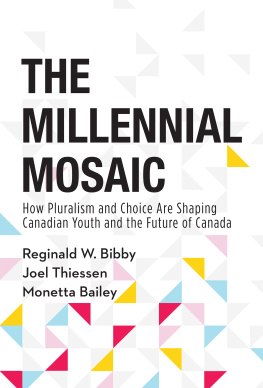
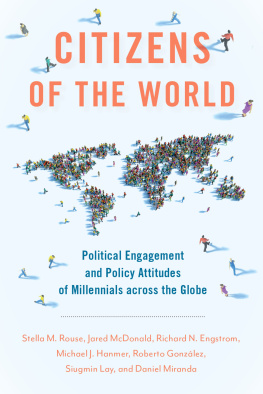
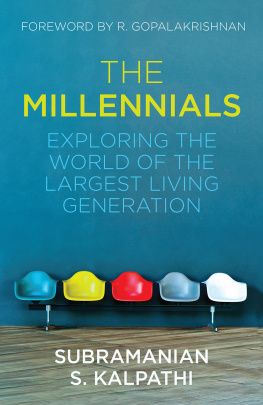
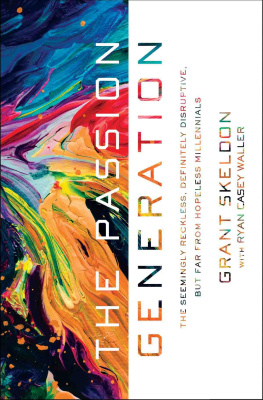
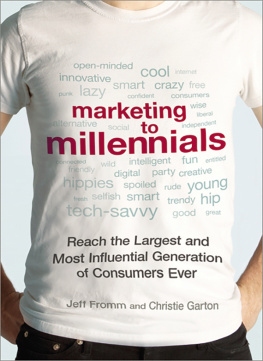
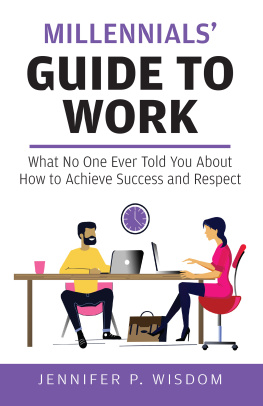
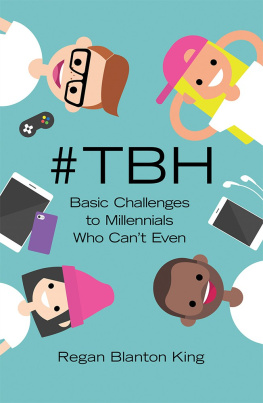
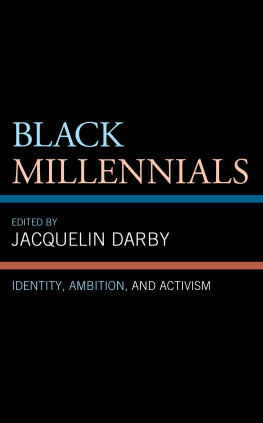
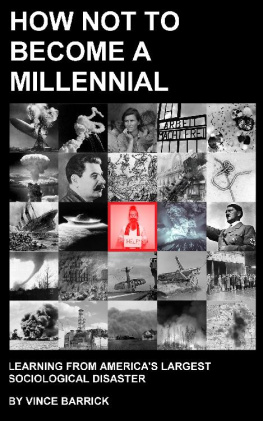


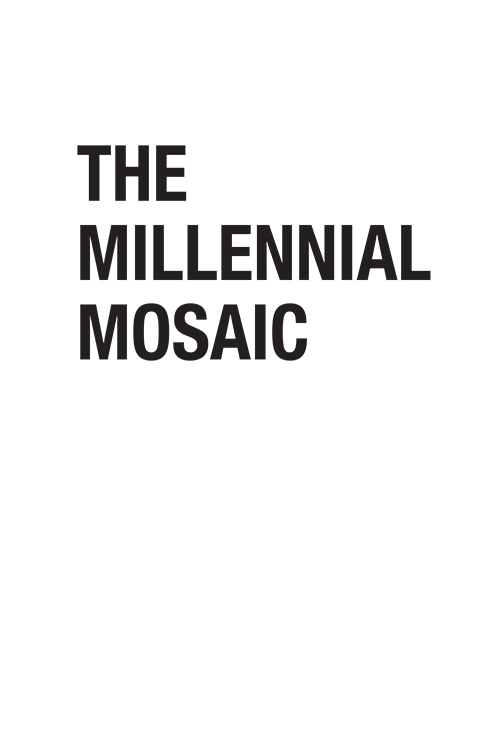


 dundurn.com
dundurn.com @dundurnpress
@dundurnpress dundurnpress
dundurnpress dundurnpress
dundurnpress